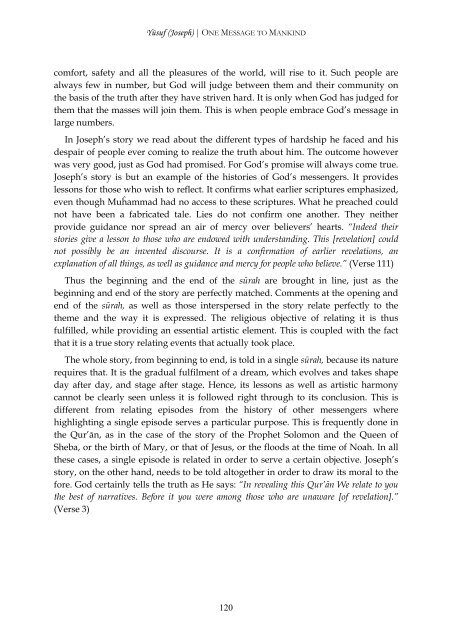Volume 10 Surah 12 - 15 - Enjoy Islam
Volume 10 Surah 12 - 15 - Enjoy Islam
Volume 10 Surah 12 - 15 - Enjoy Islam
You also want an ePaper? Increase the reach of your titles
YUMPU automatically turns print PDFs into web optimized ePapers that Google loves.
Yūsuf (Joseph) | ONE MESSAGE TO MANKIND<br />
comfort, safety and all the pleasures of the world, will rise to it. Such people are<br />
always few in number, but God will judge between them and their community on<br />
the basis of the truth after they have striven hard. It is only when God has judged for<br />
them that the masses will join them. This is when people embrace God’s message in<br />
large numbers.<br />
In Joseph’s story we read about the different types of hardship he faced and his<br />
despair of people ever coming to realize the truth about him. The outcome however<br />
was very good, just as God had promised. For God’s promise will always come true.<br />
Joseph’s story is but an example of the histories of God’s messengers. It provides<br />
lessons for those who wish to reflect. It confirms what earlier scriptures emphasized,<br />
even though Muĥammad had no access to these scriptures. What he preached could<br />
not have been a fabricated tale. Lies do not confirm one another. They neither<br />
provide guidance nor spread an air of mercy over believers’ hearts. “Indeed their<br />
stories give a lesson to those who are endowed with understanding. This [revelation] could<br />
not possibly be an invented discourse. It is a confirmation of earlier revelations, an<br />
explanation of all things, as well as guidance and mercy for people who believe.” (Verse 111)<br />
Thus the beginning and the end of the sūrah are brought in line, just as the<br />
beginning and end of the story are perfectly matched. Comments at the opening and<br />
end of the sūrah, as well as those interspersed in the story relate perfectly to the<br />
theme and the way it is expressed. The religious objective of relating it is thus<br />
fulfilled, while providing an essential artistic element. This is coupled with the fact<br />
that it is a true story relating events that actually took place.<br />
The whole story, from beginning to end, is told in a single sūrah, because its nature<br />
requires that. It is the gradual fulfilment of a dream, which evolves and takes shape<br />
day after day, and stage after stage. Hence, its lessons as well as artistic harmony<br />
cannot be clearly seen unless it is followed right through to its conclusion. This is<br />
different from relating episodes from the history of other messengers where<br />
highlighting a single episode serves a particular purpose. This is frequently done in<br />
the Qur’ān, as in the case of the story of the Prophet Solomon and the Queen of<br />
Sheba, or the birth of Mary, or that of Jesus, or the floods at the time of Noah. In all<br />
these cases, a single episode is related in order to serve a certain objective. Joseph’s<br />
story, on the other hand, needs to be told altogether in order to draw its moral to the<br />
fore. God certainly tells the truth as He says: “In revealing this Qur’ān We relate to you<br />
the best of narratives. Before it you were among those who are unaware [of revelation].”<br />
(Verse 3)<br />
<strong>12</strong>0

















